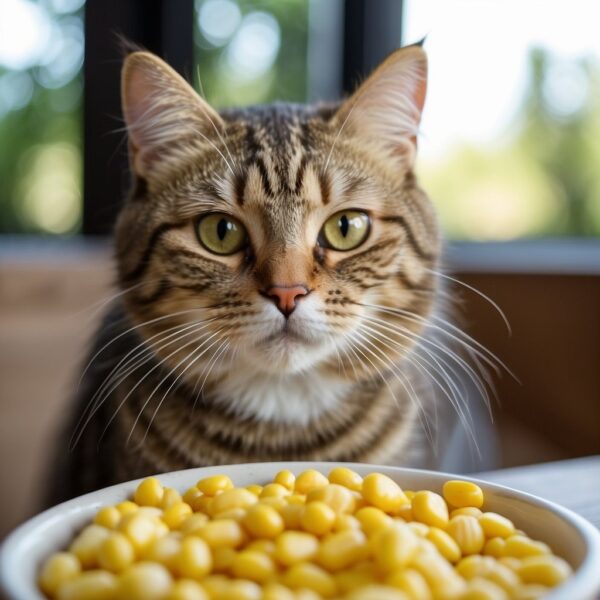
Cats Eating Corn: Minimal Nutritional Value
When it comes to the diet of a cat, the suitability of various human foods is a topic of interest for many cat parents. Corn, common in numerous human dishes, is also a frequent ingredient in cat food products, but can cats eat corn? The primary concern when feeding cats corn is whether it aligns with their nutritional needs. Cats are obligate carnivores, which means that their natural dietary requirements are predominantly fulfilled by meat.
While corn is not inherently toxic to cats, it does not provide the essential amino acids they require, and it offers little nutritional value for them. Many cats can consume corn in small quantities without immediate harm, and it is often used as a filler in commercial cat foods. However, some cats may be allergic to corn, and its consumption could potentially lead to issues such as digestive upset or obesity due to its high carbohydrate content. It’s important for cat parents to understand not only the potential benefits but also the risks associated with feeding corn to their feline companions.
Key Takeaways for cats eating corn
- Corn is not toxic to cats but offers minimal nutritional value for them.
- Feeding corn to cats should be done in moderation, mindful of allergies and carbohydrate content.
- Understanding corn’s role in cat food products is crucial for maintaining a cat’s health.
Can Cats Eat Corn?
Cats can eat corn and it is often found as an ingredient in commercial cat foods. The grain serves as a source of carbohydrates and may provide some nutritional value when fed in moderation.
Nutritional Value of Corn for Cats
Corn provides a source of carbohydrates, B vitamins, fiber, and essential fatty acids, which are components of a balanced diet. However, cats are obligate carnivores, meaning their primary dietary requirements should be met by protein from meat. Corn is not an essential part of a cat’s diet but can be offered as a treat. The fiber in corn can be beneficial for a cat’s digestion, but it should be fed in moderation due to the sugar and carbohydrate content, which can lead to unhealthy weight gain if overconsumed.
The Role of Corn in Commercial Cat Foods
In commercial cat foods, corn is commonly used as a filler or a carbohydrate source. It can be found in various forms such as corn meal or corn gluten meal. While it offers carbohydrates for energy and provides texture and taste to cat food, corn is not a substitute for high-quality animal proteins. It can also serve to bind the food together. Cat parents should be aware of the amount of corn in cat food and ensure that it is balanced with other nutrient-rich ingredients to meet their cat’s dietary needs.
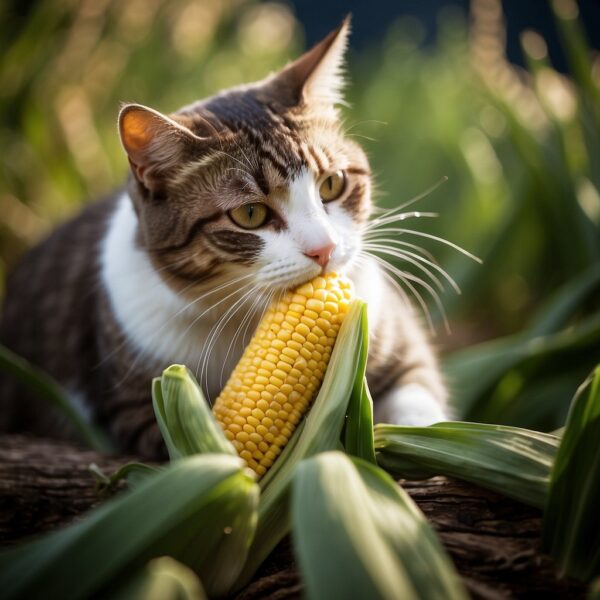
Potential Benefits and Risks of cats eating corn
When considering corn as a part of your cat’s diet, it’s important to weigh its potential nutritional benefits against the risks it may pose. Corn should always be given in moderation to avoid any adverse health effects.
Benefits of Corn in a Cat’s Diet
- Fiber Content: Corn contains dietary fiber which can support a cat’s digestion and aid in regular bowel movements.
- Energy and Nutrients: It provides a source of carbohydrates for energy, alongside certain vitamins and minerals like phosphorus and magnesium which may contribute to a cat’s overall nutrition.
Risks and Concerns with cats eating Corn
- Upset Stomach: Some cats might experience digestive upset, leading to symptoms like vomiting or diarrhea, especially if they consume too much corn.
- Allergic Reactions: While not common, some cats may have or develop allergic reactions to corn.
- Obesity and Diabetes: As a high-carbohydrate food, an excessive intake of corn could contribute to obesity and increase the risk of diabetes, so it should be a minimal part of a cat’s diet which should be primarily high in animal protein.
- Gastrointestinal Blockage: Uncooked corn kernels could cause a choking hazard or lead to a gastrointestinal blockage if consumed in large amounts.
- Digestive Issues: Specifically, the inability to digest corn sugar effectively could cause digestive upset in some cats, suggesting that they may not handle high glycemic foods well.
Safe Feeding Practices
When incorporating corn into a cat’s diet, it’s essential to proceed with caution, understanding that moderation and proper preparation are vital for safety.
How to Safely Introduce Corn
To introduce corn safely to a cat’s diet, one should start with small amounts of plain cooked corn. This means no salt, butter, or seasoning, as these can be harmful to a cat’s health. Corn should always be cooked, as raw corn can be difficult for a cat to digest. Start with a teaspoon-sized portion and observe the cat’s reaction over the next 24 hours. If there are no adverse effects, such as changes in digestion or behavior, it’s generally safe to offer small amounts as an occasional treat.
- Moderation is key: Too much corn can lead to digestive upset.
- Cooked not raw: Always feed cooked corn to ensure easy digestion.
- Plain is best: Avoid seasonings or additives that could be toxic to cats.
Identifying Allergies and Intolerances
While corn is not a common allergen in cats, some individuals may develop food allergies or intolerances. The signs of an allergic reaction can include itching, swelling, digestive upset, or changes in skin and coat condition. If a cat shows any of these symptoms after consuming corn, it’s crucial to contact your veterinarian immediately. They can provide guidance or recommend an allergy test to determine the cause of the reaction. In case of an intolerance or allergy, they will advise on the diet that best suits the cat’s needs.
- Watch for symptoms: Any adverse signs could indicate an allergy.
- Seek professional advice: A veterinarian can diagnose and advise on allergies.
- Cease feeding corn: If an allergy is present, eliminate corn from the diet.
By following these guidelines, one can ensure that feeding corn to a cat is done responsibly and safely, keeping the cat’s health and well-being at the forefront.
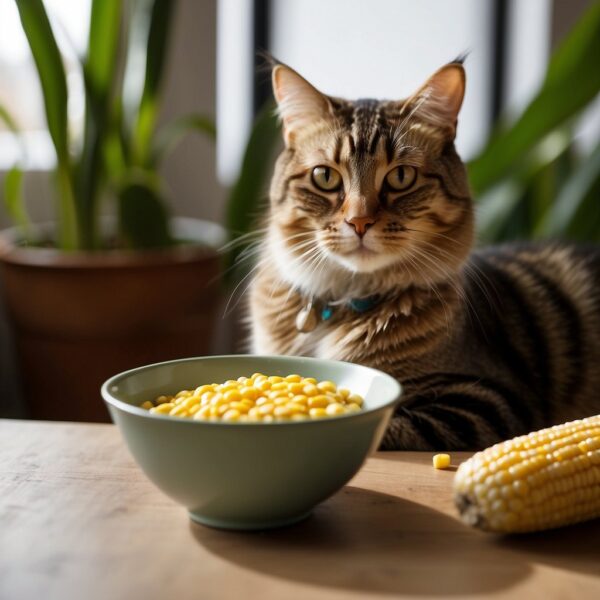
cats and corn: Common Corn Products
Many common corn products found in households can vary in their suitability for cats, often used as ingredients in cat food or encountered as snacks by pet owners.
Assessment of Different Corn Products
Popcorn: Plain, air-popped popcorn in small quantities can be safe for cats, but it offers no nutritional value. It is critical to avoid any popcorn with butter, salt, or other toppings which can be harmful to cats.
Corn Chips and Tortillas: These items are typically high in salt and fats, which are not ideal for cats. Owners should avoid offering them.
Corn Husks: These are indigestible and can pose a choking hazard or cause an intestinal blockage.
Corn on the Cob: While the corn kernels themselves may be safe in moderation, the cob can cause choking or intestinal blockage.
Corn Fillers in Cat Food: Many cat foods contain corn or cornmeal as a filler. Although not necessarily harmful, they are not a required part of a cat’s diet, which should be high in protein.
Bread and Cornbread: Such baked goods can contain ingredients that may be unsafe for cats, and they can also be high in calories, contributing to obesity.
Sweet Corn and Canned Corn: These are not toxic but are high in carbohydrates and should be offered in very limited amounts if at all.
Polenta and Cornmeal: As with other corn products, these should be given sparingly, if at all, due to their high carbohydrate content.
Corn Tortillas: Cats may eat small pieces of corn tortillas, but these offer no nutritional benefit and could contribute to obesity.
Corn Dogs: These should be avoided completely as they contain processed meats and additional ingredients like onions, which can be toxic to cats.
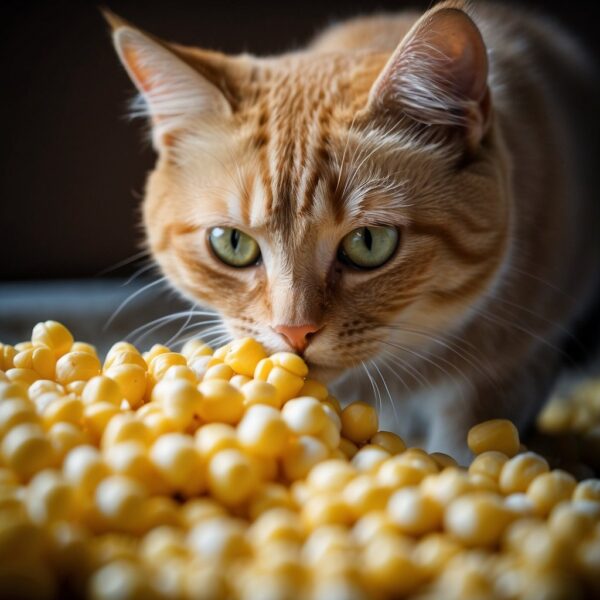
Recognizing and Responding to Adverse Reactions
Although corn is generally safe for cats, they may sometimes exhibit adverse reactions that owners should be aware of. It’s crucial to recognize symptoms of digestive upset and know when to seek veterinary assistance.
Symptoms of Digestive Upset in Cats eating corn
Cats may experience a variety of digestive issues after ingesting corn. Key symptoms to look out for include:
- Vomiting: A cat may vomit shortly after consuming corn, which can be a sign of an upset stomach or an inability to digest the corn properly.
- Diarrhea: Loose or watery stools are common indicators of digestive distress and may occur if a cat has a sensitivity to corn or its components.
- Constipation: In some cases, corn may cause constipation, resulting in infrequent or difficult bowel movements.
- Choking Hazard: Corn kernels can pose a choking risk, especially if a cat tries to eat them quickly or if they are not adequately chewed.
If a cat exhibits repeated episodes of vomiting or diarrhea, it may signify a more serious issue, such as a food allergy or intolerance, possibly to gluten found in corn.
When to Contact a Veterinarian after cat eats corn
Owners should contact their veterinarian if they notice any of the following:
- Persistent digestive symptoms, such as vomiting or diarrhea, lasting more than 24 hours.
- Signs of an allergic reaction, which might include skin irritations or itching in addition to gastrointestinal upset.
- Any indication of distress or changes in behavior following the ingestion of corn.
It is important to mention any possible exposure to corn during the consultation, especially if symptoms are present. If a cat has pre-existing conditions like heart disease, consulting with a veterinarian before introducing new foods into their diet is advisable, as diet can impact such conditions. Always err on the side of caution and seek professional advice, as they may need to perform diagnostic tests to determine the cause of the reaction and prescribe appropriate treatment.
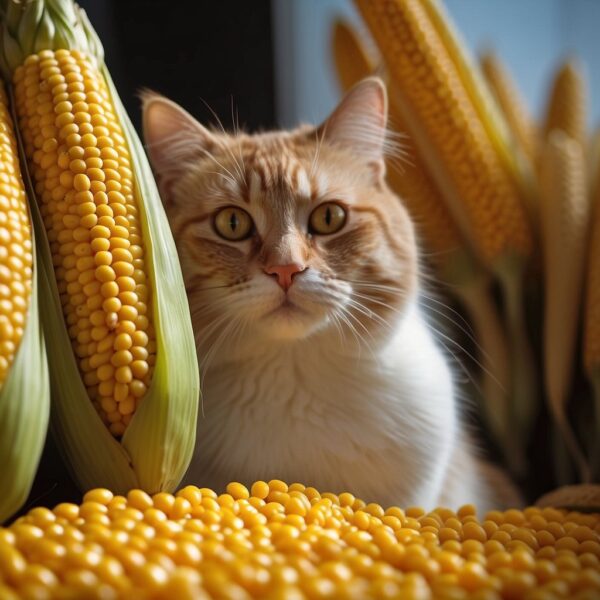
Can Cats Eat Corn? Frequently Asked Questions
When considering whether to include corn in a cat’s diet, there are several common questions that arise. Here are clear and straightforward answers to these inquiries.
Is corn on the cob safe for cats to Eat?
Corn on the cob is not inherently toxic to cats. They can nibble on small amounts of the kernels, but the cob itself poses a risk of choking or intestinal blockage if ingested.
Should cats be given corn flakes as a part of their diet?
Cats should not be regularly fed corn flakes as they offer minimal nutritional value and often contain additives and sugars that are not suitable for feline consumption.
What are the implications of feeding corn bread to cats?
Offering a cat corn bread should be done sparingly. While corn is not toxic to cats, corn bread can contain ingredients, such as sugar and salt, that are not ideal for cats.
Are there any risks attached to cats eating corn husks?
Cats should avoid corn husks as they can lead to gastrointestinal issues, including blockages if ingested. These indigestible parts should be kept out of reach.
Can feeding cats corn flour cause them health issues?
Corn flour is used as a filler in many cat foods, but it should not be a significant part of a cat’s diet. It provides little nutritional value and is not necessary for their health.
Is it appropriate to give popcorn to cats?
While popped popcorn is not toxic to cats, it is not recommended to feed them this snack. Popcorn can be a choking hazard and offers no nutritional benefits for cats.